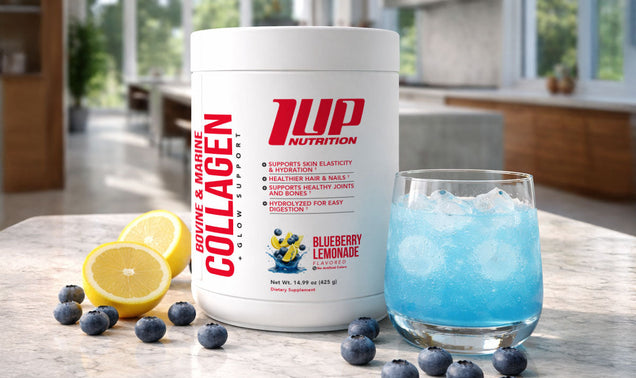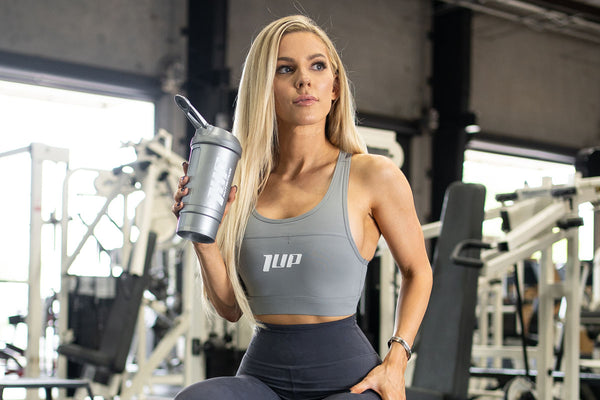There’s no greater feeling than crushing a workout, burning a ton of calories, and setting a new PR (or two). You feel indomitable, unstoppable, and superhuman…until a day or two after when tightness, soreness, and achiness pop up in places you forgot ever existed.
Welcome to the uncomfortable reality that is delayed onset muscle soreness (DOMS).
DOMS can set in as soon as 24 hours after a workout and last for up to 3-4 days!
Here are 5 tips to improve recovery after a workout, reduce DOMS, and stay on track with your fitness and physique goals.
How to Improve Recovery After Training: 5 Tips
#1 Have Protein + Carbohydrates Post-Workout
Intense workouts create microtears in muscle fiber. In order to repair those damaged muscle fibers, your body needs protein. A post-workout protein shake with whey protein (or your preferred vegan protein powder) has been the go-to option for decades.
However, intense exercise doesn’t just ramp up the body’s demand for protein…it also increases its need for carbohydrates -- the primary “fuel” of high-intensity exercise (e.g. resistance training, HIIT, etc.).
After an intense workout, carbohydrate stores (aka glycogen) are low, and consuming carbohydrates post-workout has been shown to accelerate glycogen replenishment and recovery.
Not only are glycogen stores low after prolonged, intense physical activity, stress (cortisol) levels are also elevated. Left unchecked, this could increase the risk of protein breakdown. Consuming carbohydrates lowers cortisol levels[1], supports anabolic (muscle recovery) processes, and stops catabolism by raising insulin levels -- all of which have a beneficial effect on workout recovery.
Ideal post-workout meals will include a mixture of both carbohydrates and protein. Examples include grilled steak and baked sweet potato, chicken and rice, or the ultimate quick-fix post-workout meal -- a protein shake including a scoop of 1UP protein powder with a scoop of Tri-Carb. This provides quick-digesting, highly bioavailable protein and carbohydrates to support muscle recovery, tissue repair, and glycogen replenishment.
#2 Hydrate
The human body is ~60% water, making it one of the most essential nutrients for the body. Water is required for countless biological processes, including digestion, nutrient absorption/delivery, joint lubrication, and much more. It’s also involved in metabolism and energy (ATP) production.
What this means is that even being slightly dehydrated can impair performance and recovery, not to mention total body health and well-being. In fact, research notes that ≥ 2% dehydration impairs endurance exercise, reduces strength and power output, and limits performance during high-intensity exercise. Hypohydration also increases the risk for heat-related illnesses.[2]
The primary factors influencing >90% of sweat loss among athletes are: body size, exercise intensity, exercise duration, the environment, and apparel.[3]
Most people do not consume enough water because they rely on “feeling thirsty.” Unfortunately, thirst is not a reliable marker for everyone -- some studies indicate that “relying solely on thirst as a means of replacing fluid losses during exercise, especially in hot environmental conditions, may prevent the full restoration of body water losses, leading to involuntary dehydration thirst mechanism.”[4,5]
This is why various governing bodies and athletic associations recommend that athletes should drink 500-600mL (16-21 ounces) of water or sports drink 2-to-3 hours before exercise as well as another 200-300mL (7-10.5 ounces) of water or a sports drink 10-20 minutes before exercise/competition.
Adequate fluid intake isn’t only critical for performance, but also recovery. In fact, the International Olympic Committee (IOC) issued a consensus statement declaring, “During recovery from exercise, rehydration should include replacement of both water and salts lost in sweat.”[6]
This means that consuming water alone isn’t enough to hydrate the body…you also need to consume electrolytes (salts). For this exact reason, we’ve included a precise blend of bioavailable electrolyte salts in both Pure Rebuild (our elite recovery formula) as well as our amino acid supplements, 1UP Her BCAA/EAA and 1UP His BCAA/EAA.
Moreover, replacing electrolytes and water as well as a small amount of carbohydrates after training has been shown to improve both recovery and performance in subsequent workouts compared to consuming only water post workout.[7]
#3 Get Enough Sleep
Much of the discussion surrounding workout performance and recovery centers on eating right, training hard, and using the right supplements. As important as those are (and believe us, they absolutely are essential!), there is one other factor to consider when you’re seeking superhuman recovery and results -- quality sleep.
Sleep is essential, which is another way of saying that if you don’t get enough sleep you're hindering your recovery and results, not to mention health, happiness and longevity.
Inadequate sleep (aka sleep deprivation) is known to increase levels of the body’s primary stress hormone (cortisol), and when levels of this hormone are out-of-whack, numerous unwanted side effects ensue, including (but not limited to):
- Disrupted metabolism/hormone production
- Increased protein breakdown
- Poor muscle recovery
- Reduced physical activity
- Decreased motivation
- Decreased productivity
- Increased feelings of anxiety
Essentially, if you’re walking around feeling sore all the time, and you’re not sure what’s wrong -- look at your sleep habits, and see if you’re really dedicating as much effort to your sleep as you are to your training and nutrition. Most likely, you’re not, which is the case with the vast majority of us.
With that in mind, here are some tips to help you get better sleep (and workout recovery) each night:
- Maintain a consistent bedtime/wake time
- Keep your room cool & dark
- Wear comfortable clothing
- Restrict caffeine/alcohol intake after 3PM
- Avoid blue light exposure (phones, tablets, computers, TVs, etc.) two hours before bed
- Limit stress exposures (email, social media, etc.) before bed
- Journal/Meditate/Pray before bed
- Take a warm bath/shower
- Stretch/Perform light yoga
In addition, you may also consider a nighttime relaxation and recovery aid, such as Beauty Dream or Recharge PM -- our women’s and men’s supplements to foster a quicker onset of sleep for deeper, more restorative rest and recovery.
#4 Omega-3 Fatty Acids
Omega-3 fatty acids are a class of long chain fatty acids (LFCAs) known to offer a range of beneficial effects on human health, such as supporting immune health, cognitive function, and cardiovascular health. More recent research over the past decade has unveiled yet another way in which these essential fats aid our bodies -- optimizing neuromuscular function. In case you weren’t aware, muscle damage (such as the type resulting from intense workouts) leads to immediate and sustained reductions in a muscle’s ability to generate force.[8]
Omega-3 fatty acids (EPA and DHA) may help to reduce muscle soreness, accelerate post-workout recovery, and benefit muscle force generation in a number of ways. For starters, one of the two main omega-3 fatty acids (EPA: eicosapentaenoic acid) have been shown to positively influence muscle protein turnover.[9,10] The other primary omega-3 fatty acid (DHA: docosahexaenoic acid (DHA) is found more prevalently in the brain and supports cognitive function.[11]
Research has found that “higher” doses of fish oil (3-6 grams per day) may improve subsequent workout performance and reduce muscle soreness.
For instance, a 2013 study concluded that omega-3 supplementation “...could provide benefits by minimizing post-exercise soreness and thereby facilitate exercise training.”[12]
Another study noted that omega-3 fatty acids “optimized the recovery of jump performance and muscle soreness following a damaging bout of exercise.[13]
Regularly consuming fatty fish is an effective way to obtain the recommended amount of omega-3 fatty acids per week. However, many individuals do not enjoy the taste of seafood, and/or do not have access to high-quality seafood (or the funds, since seafood is generally more expensive).
#5 Massage
Massage (manual therapy) is one of the oldest “hacks” for alleviating DOMS. It involves a masseuse applying pressure using their hands (or in some cases, elbows) to sore, tight, and/or achy parts of the body.
A 2017 meta-analysis documented that people who received a massage 24, 48, or 72 hours after a hard workout reported significantly less muscle soreness than individuals who did not get a post-workout massage.[14] One study even found that a post-workout massage could reduce swelling and alleviate DOMS by approximately 30%.[15]
Takeaway
Muscle soreness, unfortunately, is something we’ll all encounter at some point or another. As uncomfortable as DOMS may be, it doesn’t have to completely derail your training program or transformation challenge.
Use the above tips to help improve recovery after a workout, so that you can continue to train hard and get the results you want!
References
- McAllister MJ, Webb HE, Tidwell DK, Smith JW, Fountain BJ, Schilling MW, Williams RD Jr. Exogenous Carbohydrate Reduces Cortisol Response from Combined Mental and Physical Stress. Int J Sports Med. 2016 Dec;37(14):1159-1165. doi: 10.1055/s-0042-113467. Epub 2016 Oct 7. PMID: 27716864.
- Judelson DA, Maresh CM, Anderson JM, Armstrong LE, Casa DJ, Kraemer WJ, Volek JS. Hydration and muscular performance: Does fluid balance affect strength, power and high-intensity endurance? Sports Med. 2007;37:907–921.
- Gagnon, D., Jay, O., & Kenny, G.P. (2013). The evaporative requirement for heat balance determines whole-body sweat rate during exercise under conditions permitting full evaporation. The Journal of Physiology, 591(11), 2925–2935. PubMed ID: 23459754 doi:10.1113/ jphysiol.2012.248823
- Greenleaf J.E. Problem: Thirst, drinking behavior, and involuntary dehydration. Med. Sci. Sports Exerc. 1992;24:645–656. doi: 10.1249/00005768-199206000-00007.
- Adams WM, Vandermark LW, Belval LN, Casa DJ. The Utility of Thirst as a Measure of Hydration Status Following Exercise-Induced Dehydration. Nutrients. 2019 Nov 7;11(11):2689. doi: 10.3390/nu11112689. PMID: 31703247; PMCID: PMC6893511.
- IOC consensus statement on sports nutrition 2010. (2011). Journal of Sports Sciences, 29(Suppl. 1), S3–S4. doi:10.1080/02640414.2011.619349
- Moreno, I. L., Pastre, C. M., Ferreira, C., de Abreu, L. C., Valenti, V. E., & Vanderlei, L. C. M. (2013). Effects of an isotonic beverage on autonomic regulation during and after exercise. Journal of the International Society of Sports Nutrition, 10(1), 2. doi:10.1186/1550-2783-10-2
- Byrne C, Twist C, Eston R. Neuromuscular function after exercise-induced muscle damage: theoretical and applied implications. Sports Med. 2004;34(1):49-69. doi: 10.2165/00007256-200434010-00005. PMID: 14715039.
- Kamolrat T, Gray SR. The effect of eicosapentaenoic and docosahexaenoic acid on protein synthesis and breakdown in murine C2C12 myotubes. Biochem BiophysRes Commun. (2013) 432:593–8. 10.1016/j.bbrc.2013.02.041.
- Jeromson S, Mackenzie I, Doherty MK, Whitfield PD, Bell G, Dick J, et al.. Lipid remodeling and an altered membrane-associated proteome may drive the differential effects of EPA and DHA treatment on skeletal muscle glucose uptake and protein accretion. Am J Physiol Endocrinol Metab. (2018) 314:E605–19. 10.1152/ajpendo.00438.2015).
- [Igarashi M, Ma K, Gao F, Kim HW, Greenstein D, Rapoport SI, et al.. Brain lipid concentrations in bipolar disorder. J Psychiatr Res. (2010) 44:177–82. 10.1016/j.jpsychires.2009.08.001
- Jouris KB, McDaniel JL, Weiss EP. The Effect of Omega-3 Fatty Acid Supplementation on the Inflammatory Response to eccentric strength exercise. J Sports Sci Med. 2011 Sep 1;10(3):432-8. PMID: 24150614; PMCID: PMC3737804.
- VanDusseldorp TA, Escobar KA, Johnson KE, Stratton MT, Moriarty T, Kerksick CM, Mangine GT, Holmes AJ, Lee M, Endito MR, Mermier CM. Impact of Varying Dosages of Fish Oil on Recovery and Soreness Following Eccentric Exercise. Nutrients. 2020 Jul 27;12(8):2246. doi: 10.3390/nu12082246. PMID: 32727162; PMCID: PMC7468920
- Guo, J., Li, L., Gong, Y., Zhu, R., Xu, J., Zou, J., & Chen, X. (2017). Massage alleviates delayed onset muscle soreness after strenuous exercise: A systematic review and meta-analysis. Frontiers in Physiology, 8(SEP), 1–12. https://doi.org/10.3389/fphys.2017.00747
- Zainuddin Z, Newton M, Sacco P, Nosaka K. Effects of massage on delayed-onset muscle soreness, swelling, and recovery of muscle function. J Athl Train. 2005 Jul-Sep;40(3):174-80. PMID: 16284637; PMCID: PMC1250256






